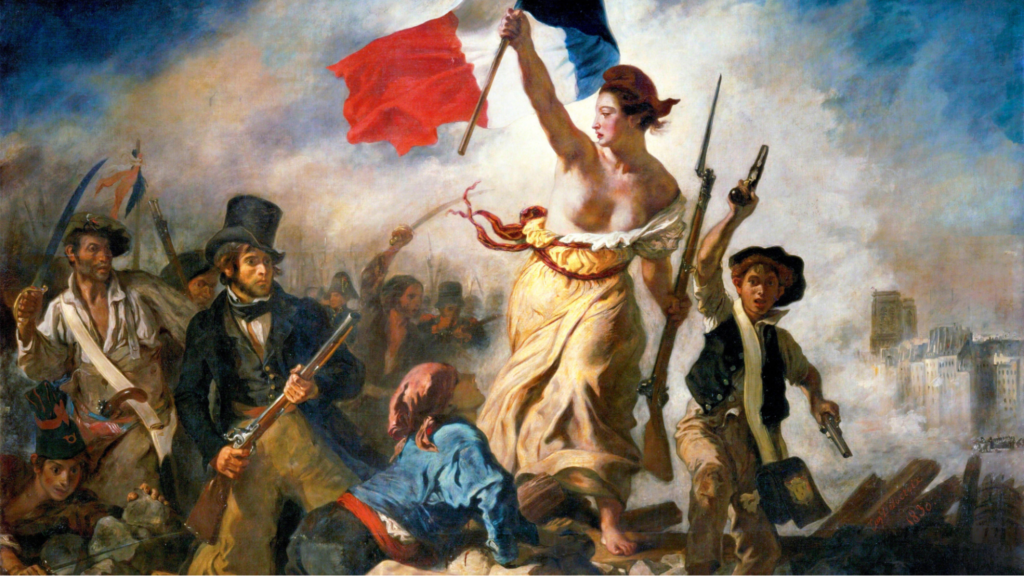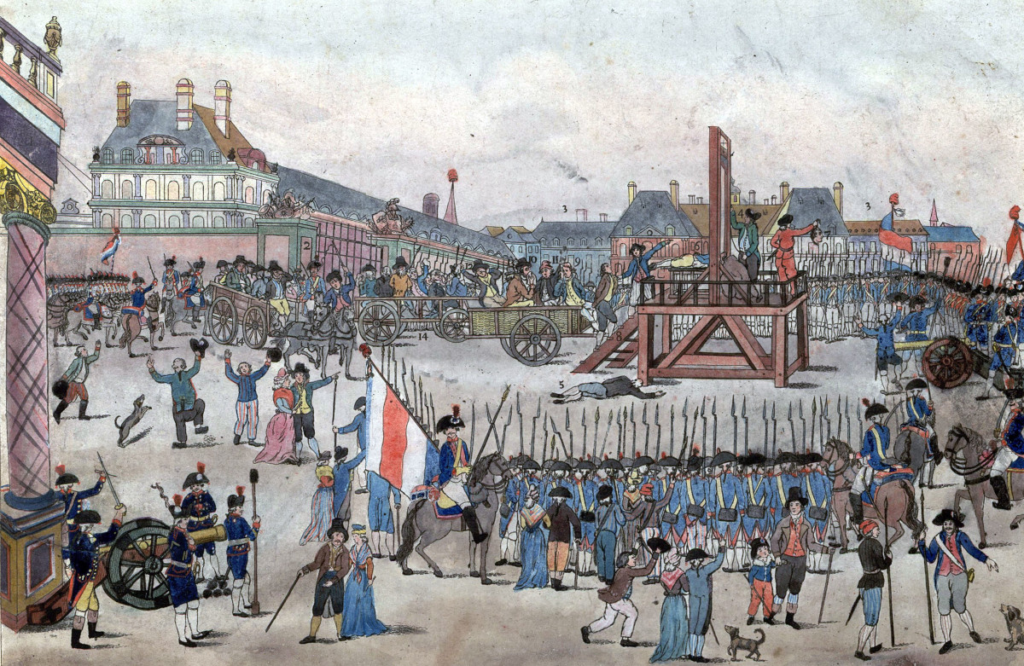what makes the french revolution significant to our lives today
- The French Revolution was an consequence that changed the course of history.
- It was a watershed moment in modern European history, and during this period French citizens uprooted one-time institutions such equally absolute monarchy and the feudal organisation.
- The upheaval was caused by widespread discontent with the French monarchy and King Louis 16'south poor economical policies, which led to his execution along with Queen Marie Antoinette.

The French Revolution started in 1789 and lasted until 1794.
Many historians think of the French Revolution every bit a turning betoken in history. The ideas from this revolution influenced the Declaration of Independence and the American Revolution.
What acquired the French Revolution
The French Revolution had many causes. Ane of these was autocracy: an all-powerful rex or queen, who had power because they believed they were given divine right.
Another cause was a defalcation and the economic problems the country faced, such as extravagant spending from the royals. In the 18th century, France had also spent a lot of money on the American Revolution and they also spent lots of money on King Louis XVI. This made them have less money to spend.
For two decades, there were many bad harvests, drought, cattle disease, and rising bread prices which fabricated people feel drastic. They expressed this by rioting, annexation, and hitting against the regime because it wouldn't give them whatever relief.
Women were involved in the events that changed French society. They hoped that their involvement would force per unit area the authorities to innovate measures to meliorate their lives.
Most women of the third estate had to work for a living and worked as seamstresses or laundresses, sold flowers or fruits, or were employed as maids in houses of wealthier people. Withal, these women did not accept teaching or whatever training, which only daughters of noblemen did. Merely aristocrats or wealthy women could get any education.
The Estates-Full general
In 1789, Male monarch Louis Sixteen wanted to fix France's problems. He chosen for the Estates-Full general. This grouping had representatives from unlike estates in France, like the clergy and dignity. The 3rd Manor formed into a National Assembly when they were mad at how the king treated them.
On June 17, the Tertiary Manor changed their name to the National Assembly and invited all 3 estates to join them. The king tried to fight but failed. So he let them get the National Assembly.
Louis Sixteen'southward ability was taken away past angry people. They forced him to let the clergy and nobility join the National Assembly. The Oath showed that citizens opposed Louis Sixteen earlier he agreed to brand concessions.
The Associates was renamed the National Constituent Assembly. It so became a governing torso. The National Associates (sometimes chosen the Constituent Assembly) became the effective government of France later on the storming of Bastille on July fourteen.
The number of delegates increased significantly during the election menses only many deputies took their time arriving. The army and people with a war machine groundwork were the Second Estate. The Third Estate was formed by men with legal professions, artisans, vendors, and the similar.
French Revolution: The Bastille and la Grande Peur
On June 12, fear and violence were happening in Paris. The National Associates was meeting in Versailles. People thought that in that location might exist a insurrection because of the rumors. On July 14, people stormed the Bastille because they wanted to get gunpowder and weapons.
That dark, people started spreading rumors that the clergy was hoarding supplies. So, the people broke in and took things. They even took 52 wagons of wheat to a public market.
That aforementioned twenty-four hour period, other people took more than things including weapons from armories. The king'due south troops didn't do anything to stop social chaos in Paris during la Grande Peur (the Bang-up Fear).
In the countryside, many people revolted against the old lodge. This happened considering they wanted to fight against their exploitation. They were so angry that they burned down the houses of tax collectors and landlords.
This made other people scared and it acquired them to leave their homes equally well. Information technology was a big bargain for France because it was function of a bigger modify that happened in 1789 when feudalism was abolished by constabulary on Baronial quaternary by The National Constituent Associates.
Read more almost Bastille Day Facts
The Declaration of the Rights of Man and the Citizen
The Constitution began with a Declaration of the Rights of Man and Citizen. Some rights, similar the correct to life and freedom of speech, were said to be "natural" rights that belonged to every person. The state had a duty to protect those rights.
The Associates signed the Declaration of the Rights of Man and of the Denizen (Déclaration des droits de 50'homme et du citoyen). This declaration is a statement most democratic principles. Information technology is based on ideas from Enlightenment thinkers similar Jean-Jacques Rousseau.
The document said that the Associates will supercede the erstwhile system with a meliorate one. The new authorities would have equal opportunity, freedom of speech communication, and pop sovereignty. They wanted to do this by having a representative government.
A group of people in French republic for months were wrestling with questions about the country's new political landscape. For example, they debated who would elect delegates, how much power the king would have in his position, and other issues.
The French regime made a constitution in 1791. They had a male monarch with ability and could choose the ministers. This was not fair for people who wanted to modify the constitution and trial Louis 16. Then they got more supporters and did this anyway.
In the early years, the revolutionary regime did innovate laws that helped ameliorate the lives of women. They fabricated schooling compulsory for all girls. Women were able to brand their own choices when it came to marriage and divorce. They could also work and be artists or run small-scale businesses.
The Marseillaise is a vocal that is from France. It was first sung by people from Marseilles, who were marching into Paris and so the name got "Marseillaise". Now it's the national canticle of France.
Revolution turns into terror

In April 1792, France declared war on Austria and Prussia. They thought that the French émigrés were building counterrevolutionary alliances in those countries. And they wanted to spread their revolutionary ethics across Europe through warfare.
In France, meanwhile, the political crisis took a radical turn when a grouping of insurgents led by extremists attacked the majestic residence in Paris and arrested the king on Baronial 10, 1792.
A wave of violence was happening in Paris. Hundreds of people who were defendant of being counterrevolutionaries were killed. The National Convention became the new leader of revolutionary France.
The National Convention abolished the monarchy and established a republic. In January 1793, they sent King Louis Sixteen to the guillotine because he was guilty of loftier treason and crimes against the land. His wife Marie-Antoinette also went to the guillotine nine months afterwards for these aforementioned crimes.
Later on the king was executed, at that place was war between France and other countries. The people were not all happy because there were some who wanted to be more like England. In that location were people in the National Convention that did non like what other people wanted, then they took control of it from them. They made a new calendar and told everyone to terminate practicing Christianity.
People in the revolution started to fight each other. They would kill people that they thought were against them. This was called "The Reign of Terror." But then people who did not similar this, led by Robespierre, fought back.
The end of the revolution
During the French Revolution, a new constitution was created. The National Convention approved it on August 22, 1795. It created France's first bicameral legislature. The power was in the easily of a Directory (Directoire) led by five men and appointed past parliament.
Many people protested the new regime. The regular army then silenced them. At that place was a new army leader. He was a young and successful full general. His proper name was Napoleon Bonaparte. The Directory'south four years in power were riddled with financial crises, popular discontent, inefficiency, and political corruption.
Napoleon and the empire
On November 9, 1799, Napoleon took the regime by force. He got rid of the Directory and named himself the new leader. This marked the end of the French Revolution and started a time when France became very powerful.
Napoleon Bonaparte crowned himself the Emperor of France. He wanted to accept over other countries in Europe and put people from his family in charge. Napoleon idea he was a modernizer, so he made laws like making certain people had private property.
At first, lots of people saw him as a liberator but presently they saw that his armies were invading everywhere. Later on, he was defeated at Waterloo.
Read more most Napoleonic Wars
Consequences of the French Revolution
Freedom and commonwealth were the most important legacy of the French Revolution. People in Europe learned about these ideas during the 19th century, when they overthrew their feudal system. People living in colonies changed the idea of freedom into a movement to create sovereign states.
Sources
- https://world wide web.history.com/topics/france/french-revolution
- https://www.britannica.com/outcome/French-Revolution
- https://world wide web.nationalarchives.gov.united kingdom of great britain and northern ireland/education/resource/french-revolution/
- https://www.bbc.co.united kingdom/bitesize/guides/zpwp34j/revision/five
P.S. If you enjoyed what you read and are a instructor or tutor needing resources for your students from kindergarten all the way up to high school senior (or fifty-fifty adults!), cheque out our partner sites KidsKonnect, SchoolHistory, and HelpTeaching for hundreds of facts, worksheets, activities, quizzes, courses, and more!
Source: https://historyforkids.org/french-revolution/
0 Response to "what makes the french revolution significant to our lives today"
Post a Comment